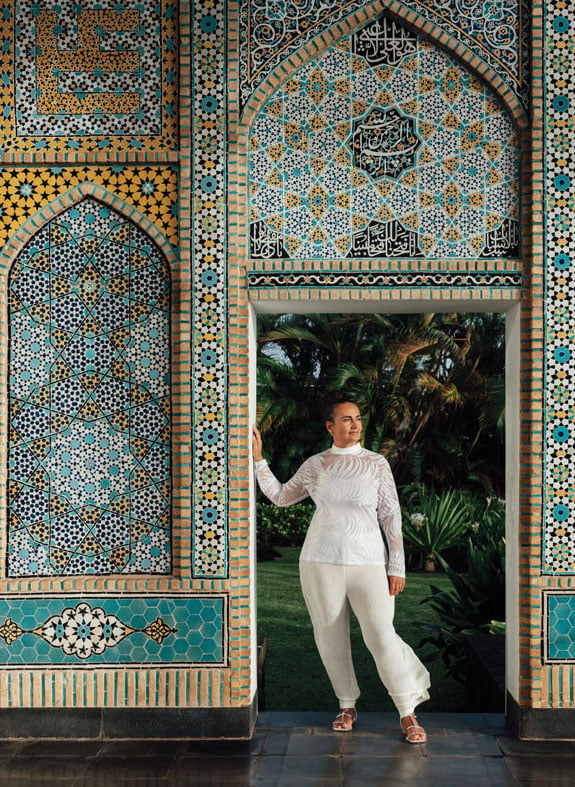
In celebration of Women’s History Month, we turned to five leading wāhine, who inspire us with their passion, artistry, generosity and perseverance, to bring the latest in local spring fashions to life. Spanning in age from 43 to 70, these ladies excel across a variety of arenas, from the worlds of film and advocacy to art and design, serving as curators, educators, storytellers and more. All are examples of how, when tackled with ferocity and intention, each new chapter in life can be as, if not more, fulfilling and accomplished than the last. We paired each with talented Hawai‘i designers, skilled at creating for the female form. We hope that their words and looks encourage you to be just as bold, both in fashion and in life.
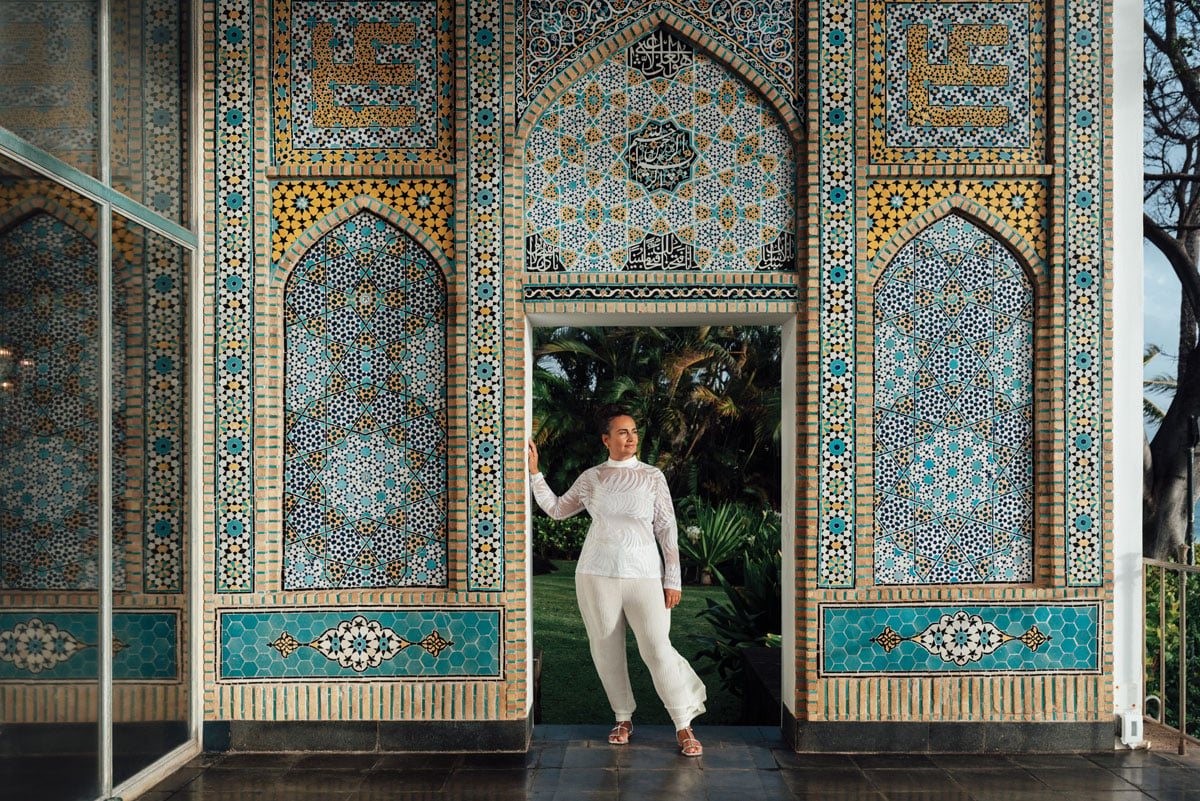
Vera Zambonelli
51, Filmmaker, Founder/Executive Director of Hawai‘i Women in Filmmaking
What do you enjoy most about being your age?
A stronger sense of self-awareness, confidence, understanding that it is always a work in progress, and gratitude that I lived so long.
Why is it important for women to mentor other women?
Mentorship is an essential aspect of career development and progression, and it gains even more significance when women mentor other women. Women face unique challenges in and out of the workplace, ranging from gender bias and harassment to a lack of representation in leadership positions. A mentor who has been through similar experiences can provide valuable guidance and support to help navigate these challenges.
Women mentoring other women can also help to break down the barriers and stereotypes that have historically limited women’s professional and sometimes personal growth. Mentors can provide their mentees with access to networks, resources and opportunities that they may not have otherwise had. This can lead to increased confidence, skill development, career advancement and ultimately, a community that thrives and invests in each other’s success.
Additionally, mentorship can help to create a sense of community among women. It allows for the sharing of experiences and perspectives, which can lead to greater understanding, empathy and collaboration. By supporting and uplifting one another, women can work together to create a more inclusive and equitable society.
What do women bring to the world of filmmaking that is unique?
Women have been steadily making their presence felt in the world of filmmaking in recent years, and their contributions have been nothing short of phenomenal. Women bring a unique perspective to filmmaking that is rooted in their experiences and worldview. This perspective often allows them to tell stories that are different from those that their male counterparts might tell. Women filmmakers are often able to create more nuanced, complex characters and explore issues that are important to women—gender inequality, reproductive rights, sexuality, and motherhood—and to our society as a whole. In fact, films by women do not need to be only about women and certainly they benefit everyone!
Women filmmakers also bring a different sensibility to the craft of filmmaking. They are often more collaborative and inclusive, and they tend to prioritize emotional resonance and character development over spectacle and action. This approach can lead to films that are more intimate and emotionally impactful that resonate more deeply with audiences.
Finally, women filmmakers are changing the face of the industry by creating opportunities for other women to succeed in the field. They are mentoring and supporting up-and-coming female filmmakers and advocating for gender parity in the industry. By doing so, they are helping to create a more diverse and inclusive film culture that reflects the richness and complexity of the world we live in.
What is the value of having women represented both in front of and behind the camera?
It’s crucial for creating a more diverse and inclusive media industry. When women are involved in the production of films and television shows, their perspectives and experiences can be represented more accurately and authentically. This leads to more nuanced and complex portrayals of women on screen.
Additionally, having women in positions of power in the film and television industry can help to combat gender-based discrimination and harassment. By creating a more equitable workplace, women are more likely to feel comfortable and safe working in the industry, and therefore pursuing their dreams and telling their stories.
Furthermore, having more women involved in the media industry can inspire the next generation of young women to pursue careers in film and television. When young girls see women in positions of power and influence, they are more likely to believe that they can achieve those same positions themselves.
Which of your projects should we keep an eye out for next?
The Women of Wonders Film Festival happening March 8 at HoMA, and Reel Wāhine of Hawai‘i season five, which is in production thanks to a National Endowment for the Arts award.
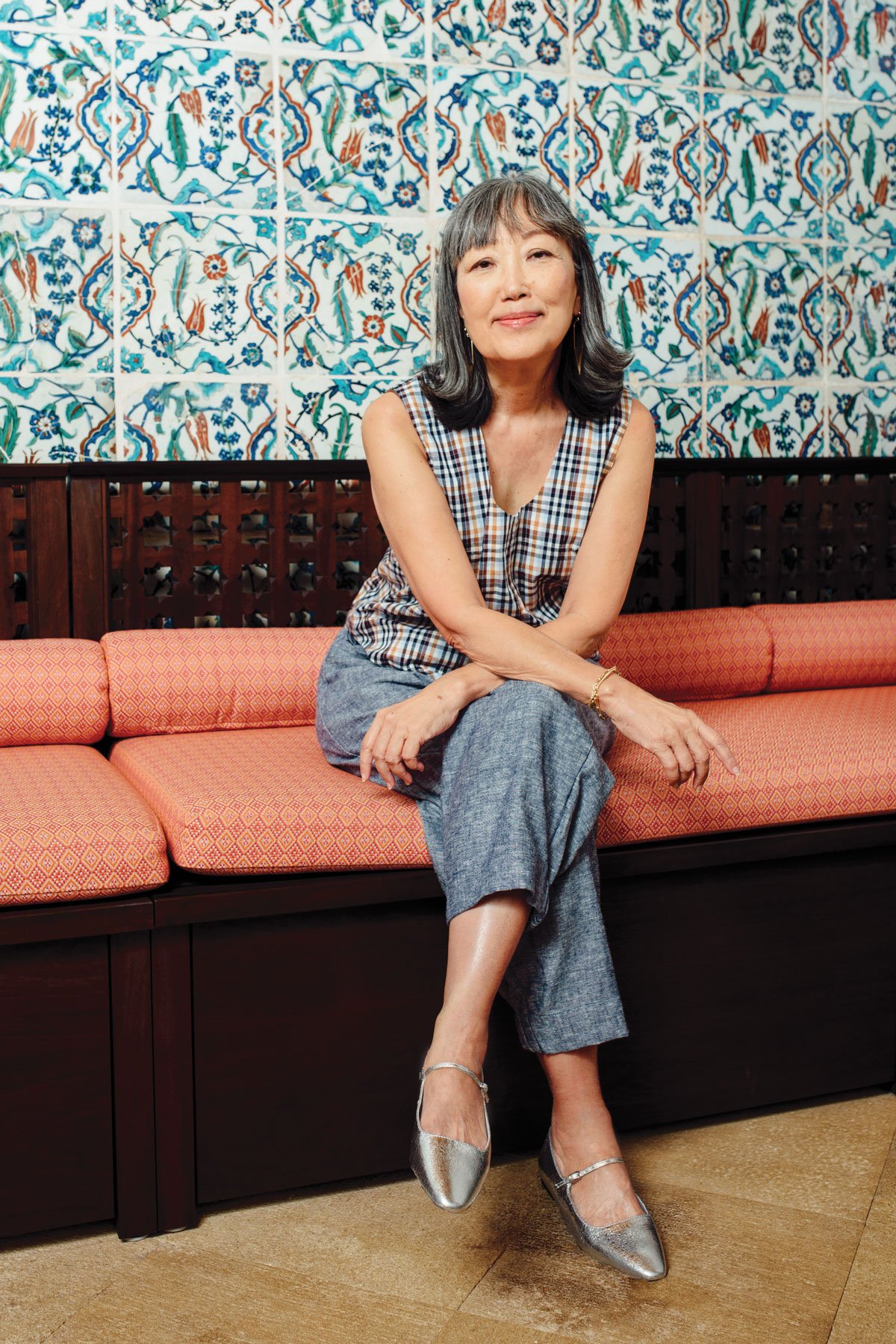
Maura Fujihira
67, Interior Designer, Co-Owner of Fishcake
Why is it important to support female artists/designers with showroom and gallery space?
I think it’s important to support artists/designers in general with a space.
How has having a supportive female community or mentors helped you in building your business?
Having a supportive female community has really meant everything. Without my partners, mentors and friends, Fishcake wouldn’t be where we are today, that’s for sure! It just so happens that my support group are mostly fellow women and our young “fish” staffers (now all women again!) are very active and put a lot of heart into what they’re doing here. Everyone has brought their own unique talent over the 16 years we’ve been in business, and my wish is for Fishcake to continue to be a fun place to find your passion, hone skills, gain experience and grow as people.
What do you enjoy most about being 67?
Just the feeling that everything is still fresh every day!
If you had to give your 20-something self advice, what would it be?
Just go for it! It’s never too late!
Which of your projects should we keep an eye out for next?
We’re projecting an expanded ceramics studio membership and, of course, adding more to our Fishschool program of creative workshops. It seems that there’s a real need in the community, and we are very fortunate to be able to help fill that.
Fishcake continues to support local artists and makers by providing a curated venue for their work. “Living with art” has been our raison d’etre since our inception back in 2007— the concept being to show “living” environments (furniture and interior design) mixing with art by local artists. We have a roster of interesting shows planned for 2024, the next show being “No Fo’get” curated by Wendy Kim Messier for women and men artists of a certain age!
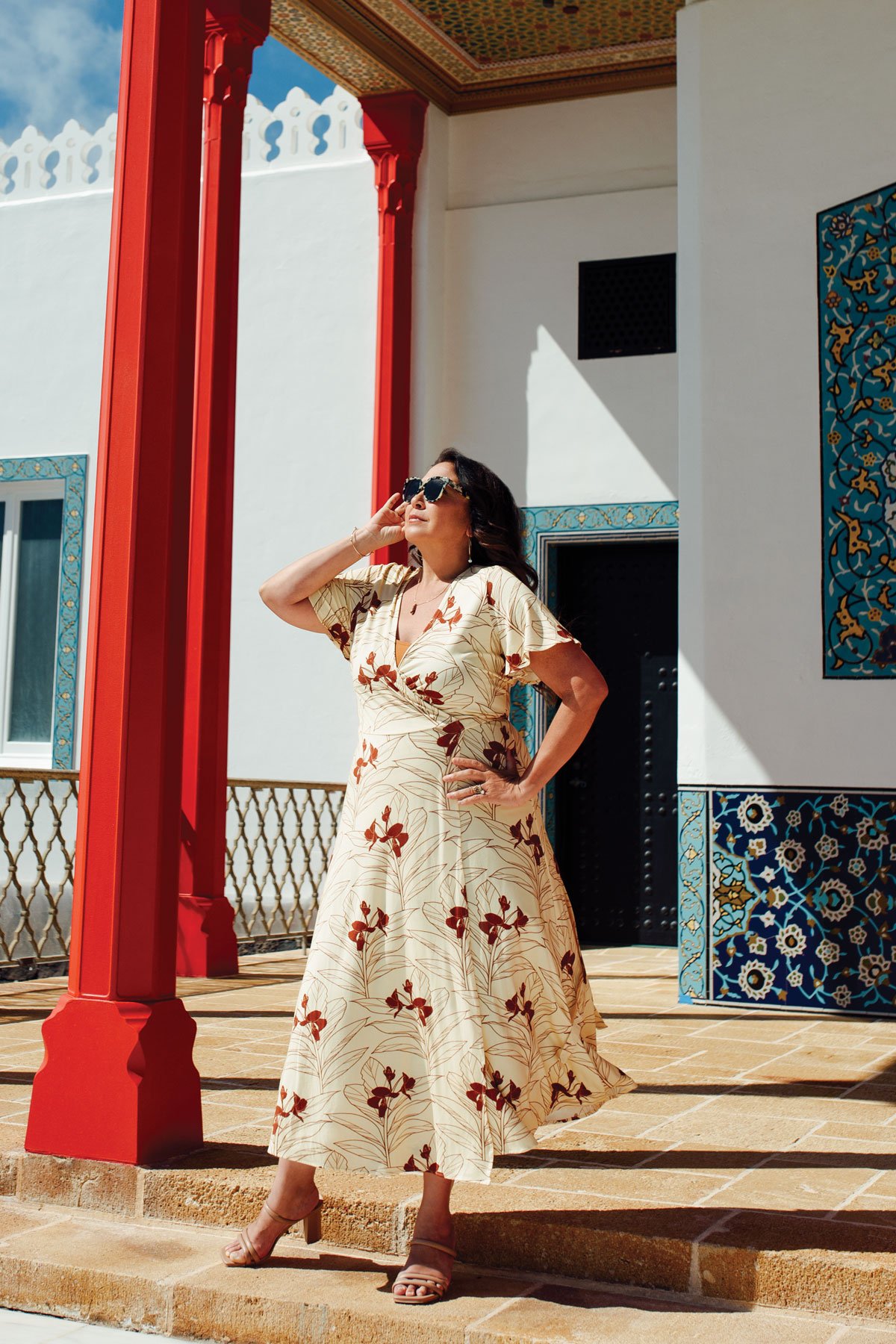
Jalene Kanani Bell
53, Textile Designer, President/Creative Director of Noho Home
Why should women feel unafraid, emboldened even, to launch new business ventures later in life?
It’s such an asset to have life experience. Years of feedback from friends and family on how they make purchases, having to balance finances for a family, emotional intelligence, networks, all really help to have as a foundation so you can quickly move past the basics to focus on more strategic goals.
What unique perspectives do female designers bring to interior design?
Female designers have a keen sense of function in, and connection to, a space. Stemming from traditional roles of nurturer, homemaker and hostess, women tend to match their desire for beauty and form with mindful connection and utility function.
What do you enjoy most about being 53?
As I get older, I appreciate the gradual breakdown of stigmas, dogmatic thought and self-inflicted negative thoughts and anxiety. There is a sense of exhaling and relaxing into your life’s experiences and appreciating them for what they were.
If you had to give your 20-something self advice, what would it be?
I would advise my 20-something self to dig into relationships, spend more time listening and not always fixing. People just want to be heard.
Which of your projects should we keep an eye out for next?
In 2024, Noho Home by Jalene Kanani will have new introductions to the Leihōkū Collection, a collaboration with Hawaiian Airlines, and I will be mentoring with FoundHer, which empowers women-led businesses rooted in culture and community.
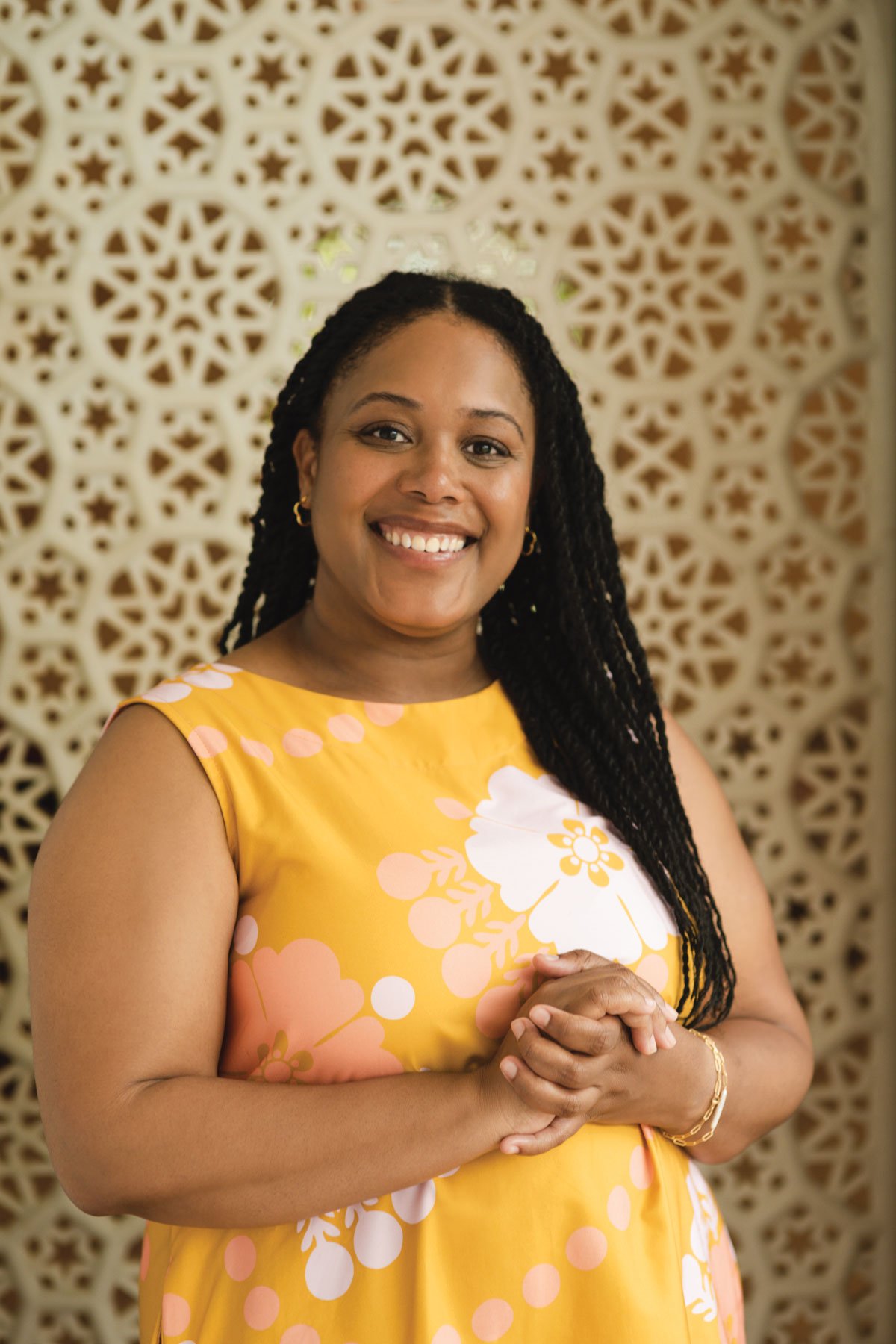
Akiemi Glenn
43, Linguist, Founder/Executive Director of The Pōpolo Project
What do you enjoy most about being your age?
I appreciate the life experience and the many learning opportunities that I have been lucky to have at my age that combine to make me endlessly curious and confident in my own skin. I am grateful for the relationships with loved ones, friends, and communities here in Hawai‘i and around the world that I have been able to build over several decades now.
It’s fantastic that The Pōpolo Project has multiple youth programs—why do you feel it’s important to offer mentorship to keiki, especially girls?
Because of the size of our community and the ways that Hawai‘i society functions, many Black kids in Hawai‘i are in need of intentional opportunities to develop a sense of belonging and connection as they navigate their formative years and come to understand their identities and responsibilities in the world.
Black women specifically continue to deal with misogyny and anti-Blackness in ways that require us to support each other to survive in many aspects of our lives. This kinship has literally saved our lives and is an important feature of Black community life. Especially for Black girls who face societal pressures and stereotypes that impact their self-esteem and emotional development, it’s important that they can sustain connections with adults who care about them and who can relate to their experiences. Their futures depend on it. Mentorship is one of the ways girls get to experience this important kinship outside of their immediate families and come to understand what community looks like and feels like.
One of the many beautiful things about our community is that many adults are well aware and prepared to address the challenges that face Black kids anywhere, even in Hawai‘i. They bring loving attentiveness to their mentorship of kids who need it while also helping them learn about the cultures and heritage of the community, instilling feelings of safety and welcome on the interpersonal level, and pride in who they are and where they come from as our young ones move in the world.
In what ways are women uniquely poised to facilitate connections across Hawai‘i’s Black communities?
People of all genders have crucial roles to play in our Black community in Hawai‘i. Historically, women have been leaders here in forwarding political action, creating organizations and lifting up our story. Some of the brightest stars in our history are women like Carlotta Stewart Lai, Alice Ball, Helene Hale, down to more recent leaders like Faye Kennedy, the women who founded the Honolulu African American Film Festival 13 years ago and many other social justice advocates and as of yet unsung community leaders. Scholar and poet Dr. Kathryn Waddell-Takara, a longtime Hawai‘i resident who moved here in the 1960s, has written about Black women’s role as culture bearers in our community. We’ve seen women who care deeply about this place do complex bridging work to bring us all together in the name of art and culture, connecting us to our ancestors, and to the global political and social movements of Black people beyond our shores.
What makes women natural leaders when it comes to the preservation and/or revitalization of Indigenous languages?
Language revitalization can only be done alongside community revitalization. It’s crucial to understand that no community gives up their traditional language without tremendous economic, political, and social pressure, and the work we do to bring a particular language back into the social life of its people has to address that. A true language revitalization effort needs everyone, across genders, generations and locations. People of all genders have a role to play in supporting Indigenous languages, and there has been important leadership shown by women in many communities, especially when those efforts focus on language learning for early childhood and returning language to the domains of the home and family.
Which of your projects should we keep an eye out for next?
I am excited about the Pōpolo Project’s documentary, The Heart’s Desire, which follows local falsetto phenom Kamakakēhau Fernandez on a journey of discovery as he travels from Maui, where he was raised, to Little Rock, Arkansas, where he was born, and on to West Africa. Those interested in learning more can visit thepopoloproject.org.
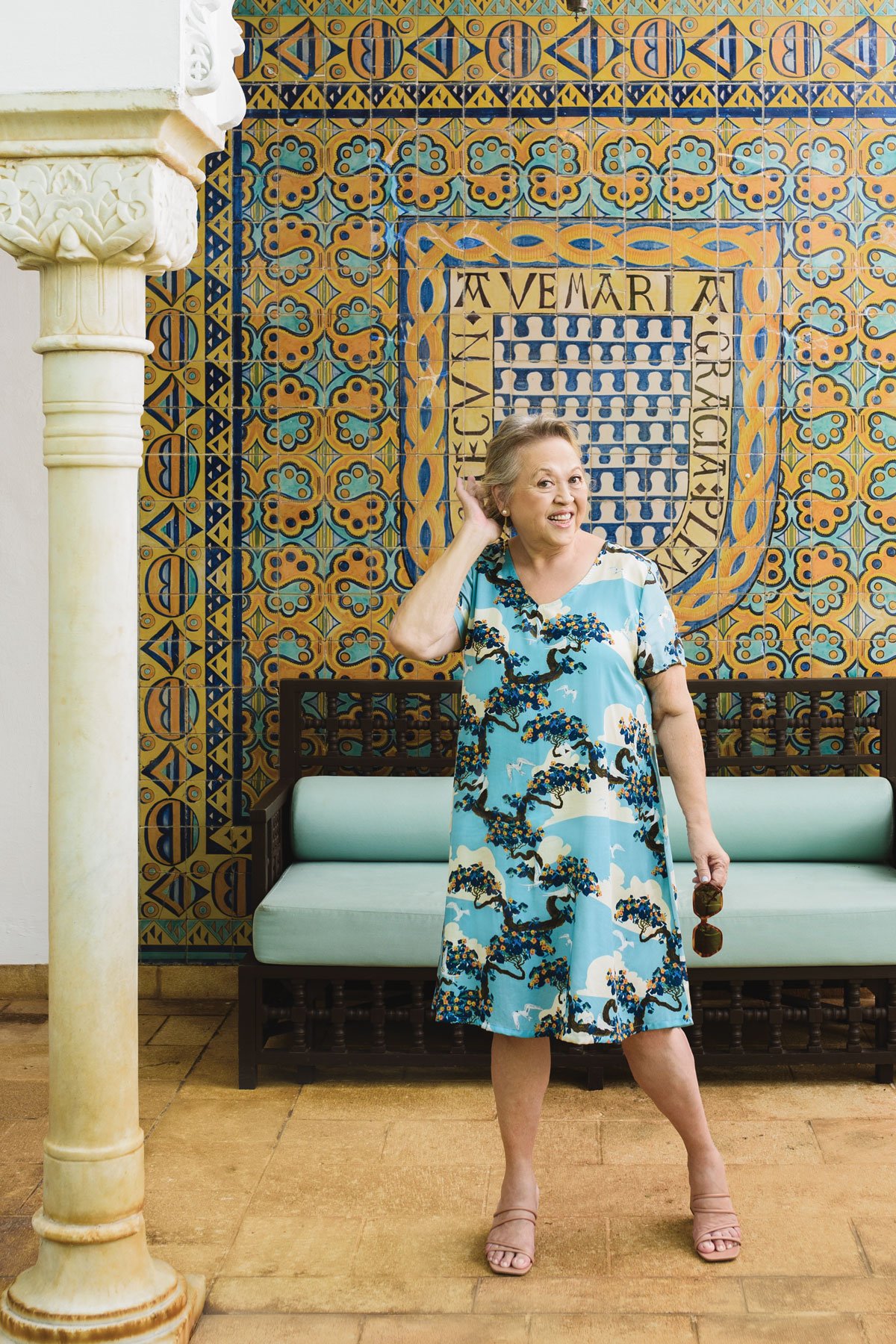
Amy Hill
70, Actress, Writer, Director
What do you enjoy most about being the age you are?
I’m very happy the older I get. I worry less about what people think and … worry less about what I haven’t achieved and look forward to the future and what I might accomplish that I didn’t expect.
If you had to give your 20-something self advice, what would it be?
I would tell my 20-something self to relax and enjoy the ride. And have gratitude for all of the disappointments and frustrations and failures because they helped me grow as an artist and as a human.
As a Japanese American woman, why does the representation of Asian American women continue to be important in the entertainment industry, despite the progress that has been made?
I feel in entertainment there needs to be a diversity of Asian American women. All shapes, all sizes, all temperaments, immigrants, people born here, people born elsewhere—with or without accents. Just a big, colorful, wonderful world of Asian American women, funny as hell, but also filled with self-doubt, pain and challenges.
The future of comedy is female—would you agree? How can we help to ensure that future stays bright?
It is still a challenge to see women as funny. Innately funny. Funny without being the butt of the joke. Women still struggle in comedy, as well as in other areas of the industry, to have parity with men in terms of pay as well as visibility.
Which of your projects should we tell readers to keep an eye out for next?
I am currently shooting the live action version of Lilo and Stitch. Stitch is CGI. The rest are human, and I play a new character that was not in the animation. My character is named Tūtū, and I am a neighbor who is overly involved in the young sisters’ lives. (In the story, Lilo has an older sister Nani.) It’s a very touching film which still adheres to the original storyline that goes deeper. I think audiences will enjoy.
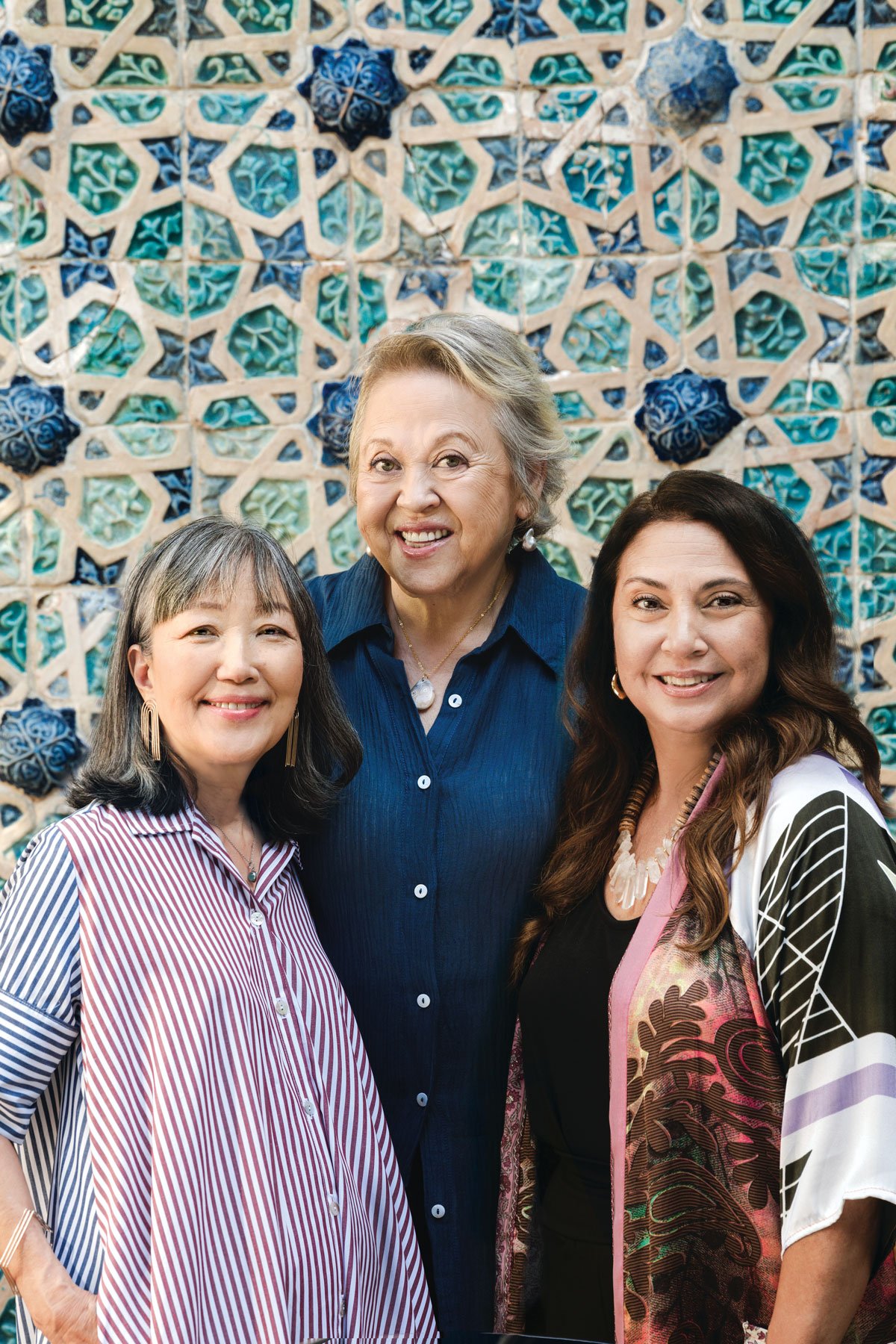
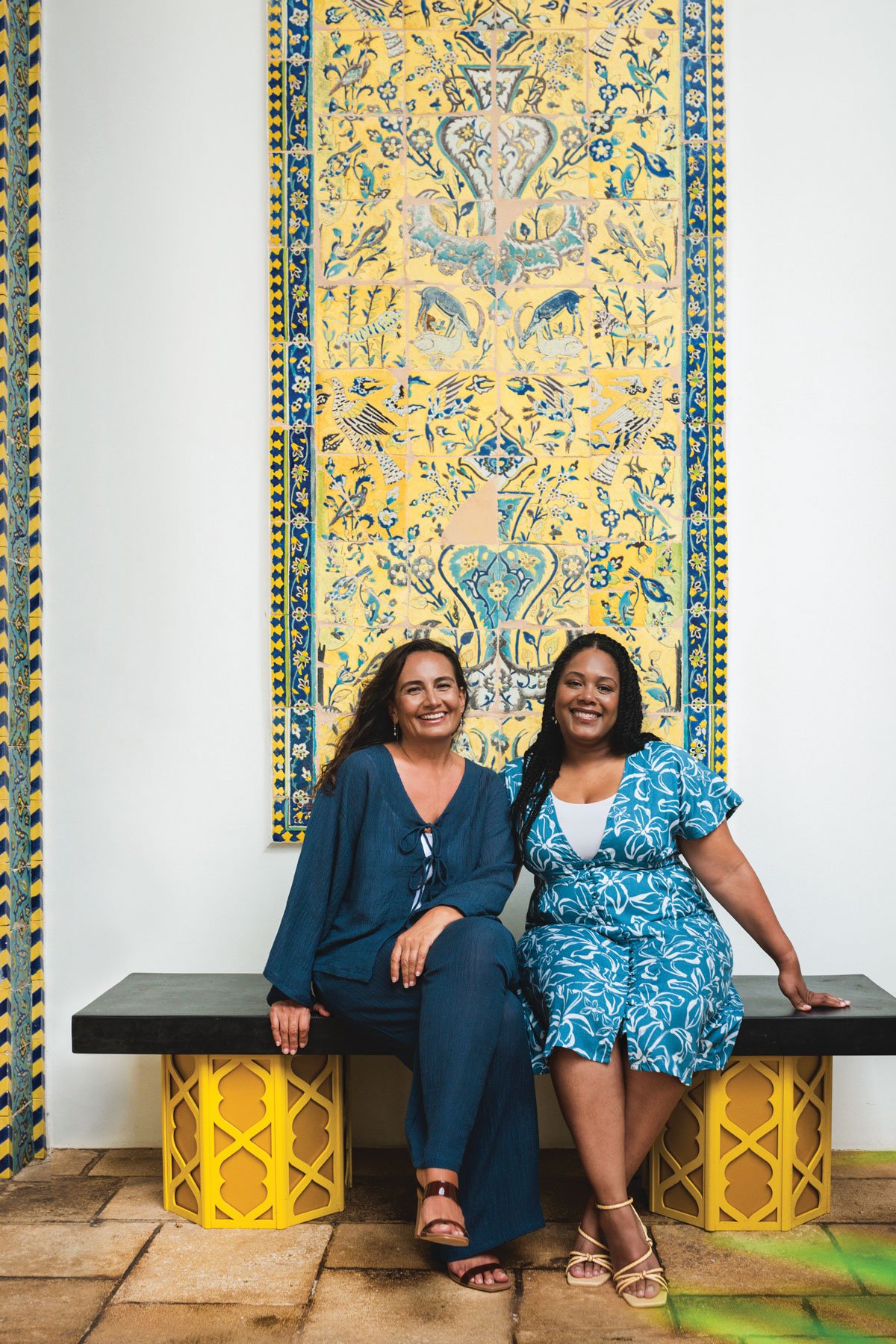
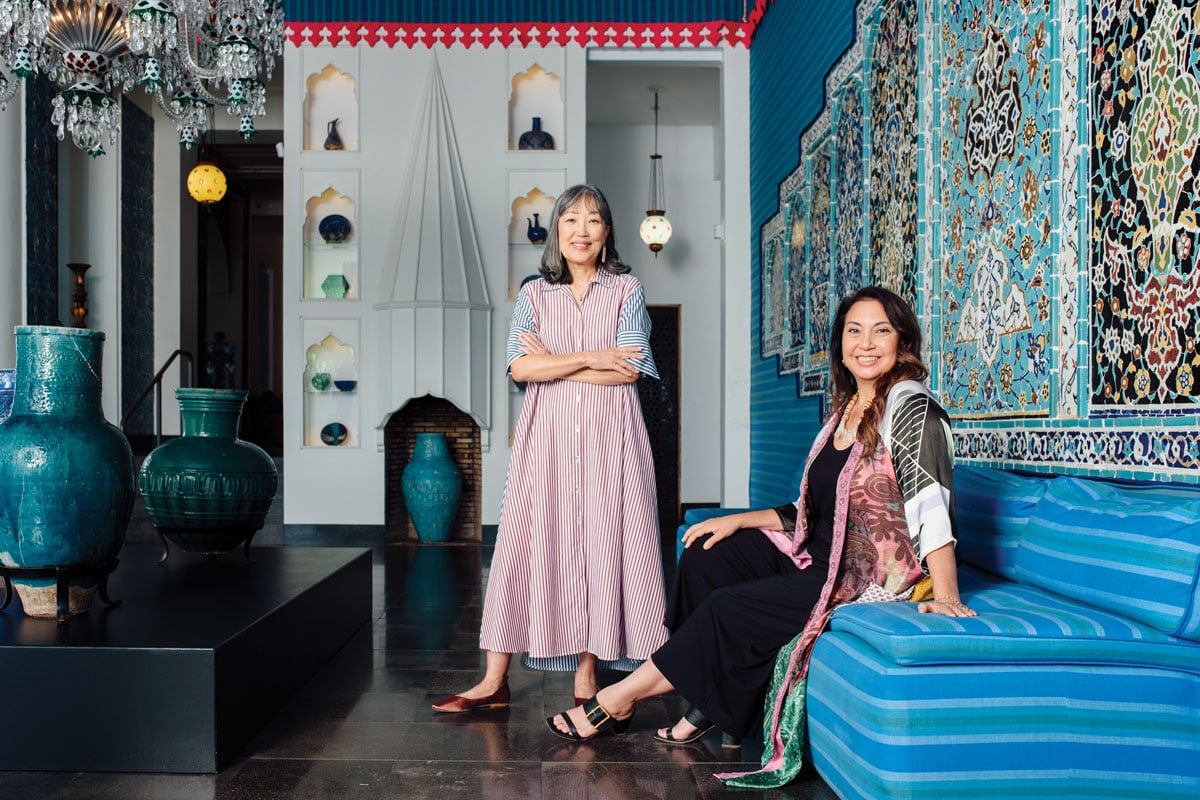
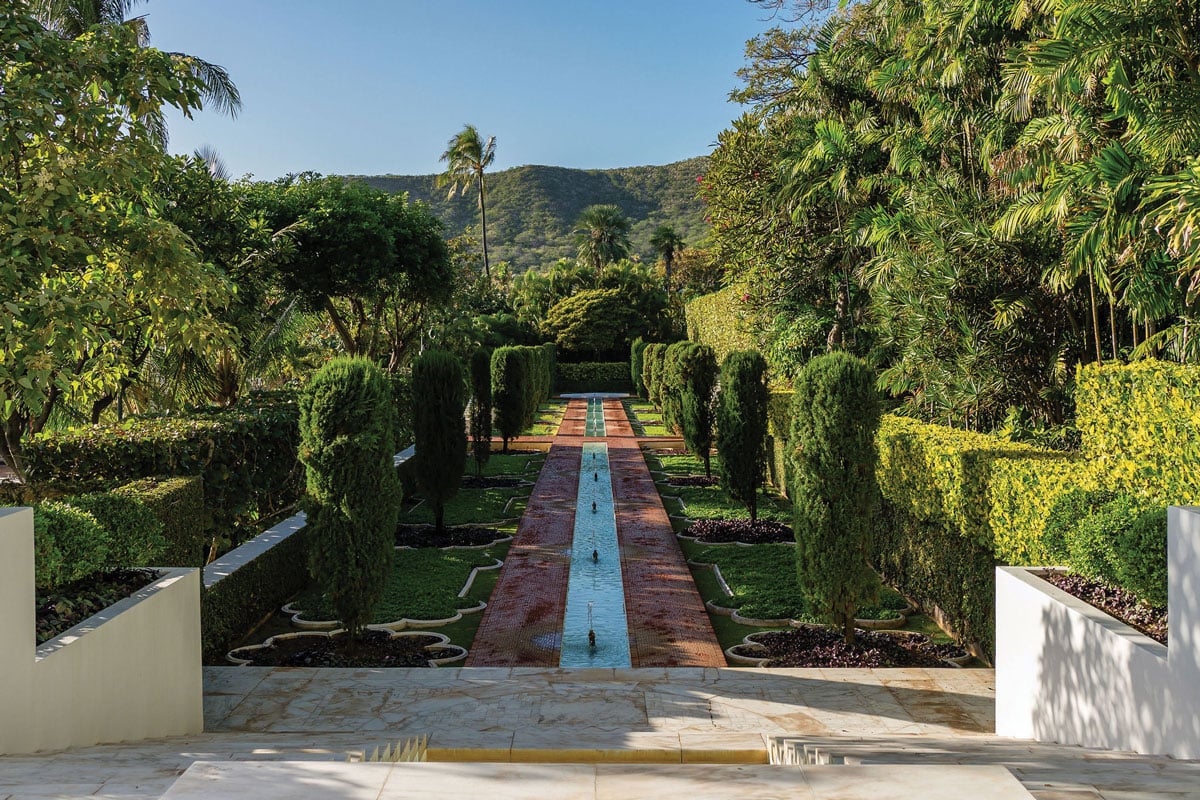
SHANGRI LA
Our spring fashion editorial was photographed in Honolulu at Shangri La, a center of the Doris Duke Foundation, an organization dedicated to building a more creative, equitable and sustainable future by investing in artists and the performing arts, environmental conservation, medical research, child well-being and greater mutual understanding among diverse communities.
A lifelong philanthropist, innovator and patron of the arts, Doris Duke left her fortune, extensive collections of art and properties, including Shangri La, to a foundation that would be created in her name. Today, Shangri La convenes conversations of local and global significance through its residencies, exhibitions and community programs.
“Shangri La is honored to be a platform for these incredible leaders featured as part of Women’s History Month. Doris Duke herself was progressive, challenging conventional assumptions of feminine power and beauty. These amazing women in the Honolulu community are making an impact towards a more creative, equitable and sustainable future.” —Ben Weitz, Shangri La Museum of Islamic Art, Culture & Design
shangrilahawaii.org, @hi_shangrila, dorisduke.org, @dorisdukefdn
PHOTOSHOOT CREDITS
Creative Direction
James Nakamura
Art Direction
Christine Labrador
Hair and Makeup
Kecia Littman,
Kristina Waiau-Lewis
Photo Assistants
Melissa Williams,
Sara Uduwela